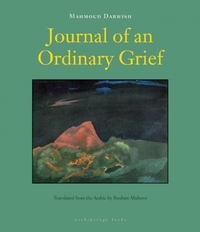Take a photo of a barcode or cover
emotional
informative
reflective
medium-paced
challenging
dark
emotional
informative
reflective
sad
informative
reflective
emotional
reflective
slow-paced
medium-paced
dark
emotional
hopeful
informative
reflective
sad
challenging
emotional
informative
reflective
slow-paced
challenging
funny
informative
reflective
sad
medium-paced
emotional
informative
inspiring
reflective
sad
fast-paced
I can’t believe it's taken me this long to get to the works of Mahmoud Darwish. I’ve been aware of him for years as the pinnacle of Palestinian literature but unfortunately my reading experience so far has mainly been limited to Palestinian non fiction.
That is not to say that anything here is not deeply rooted in the reality of the world in which Darwish was raised and existed in. Born in 1941 and having published this work in 1973, Journal of an Ordinary Grief is deeply informed by the state of the Middle East at this time. While the pressing issues of the early 70s are at the forefront, the themes of this book are far from irrelevant to today’s state of affairs.
This is the unfortunate beauty of many great Palestinian works. For as brief as this book is, it really covers so many issues of power disparity between Palestinians and Israelis and how systemic that is. Darwish offers such great commentary on homeland and identity as well as the reality of life as a refugee.
Beyond the content of this book, the real allure of this book is Darwish’s literary ability. There's a reason he is the figurehead when it comes to Palestinian literature. Often described as poetic. This book is far from the typical prose of poetry. While still rife with style and flare, many of these passages feel very conversational. Spread out over a few pages these ideas are explored in much greater detail than most “poetry”.
Typically I find the minimal nature of poetry to be my biggest barrier to entry and that problem is nowhere near apparent here. I was instantly drawn into sections and followed along with every word. I’m not sure if this would be the case if this was a longer work but for the length of this collection I found it to work perfectly.
Overall I would recommend this as the work for someone to read if they were to only read one book on the Palestinian experience. While based in the realities of the early 1970s, many of these points are still hauntingly true. The only disappointment I’m left with is knowing that Darwish’s talents could have been explored in so many other avenues rather than just pleading for the rest of the world to recognize his humanity.






